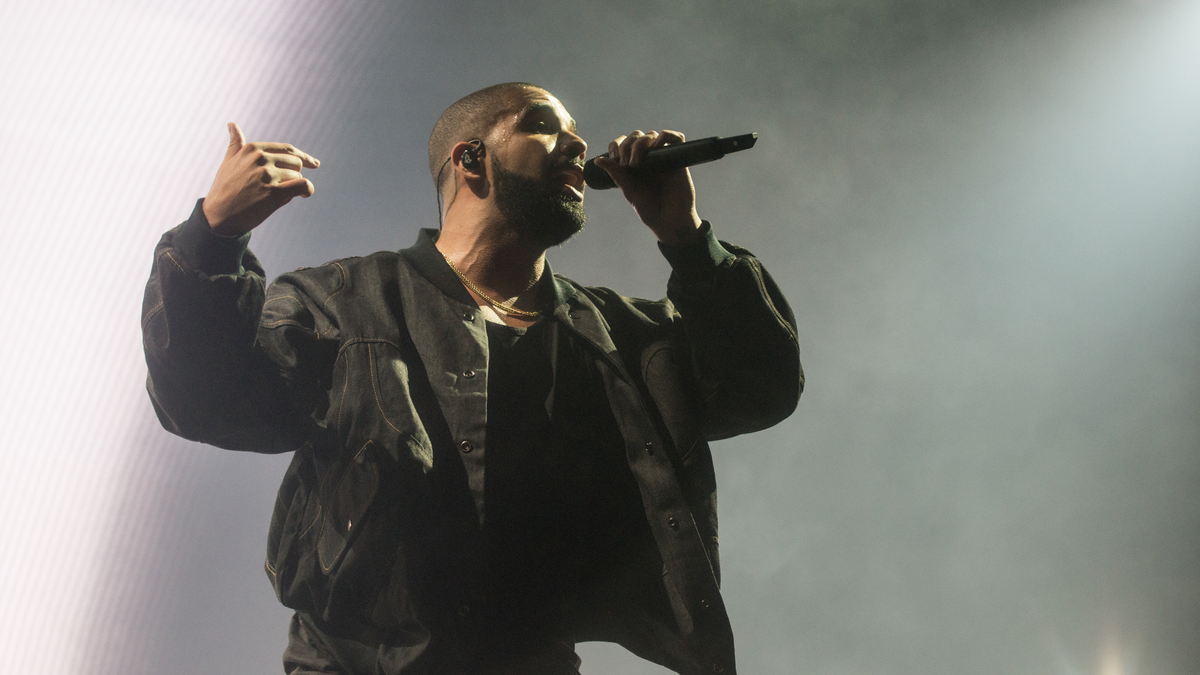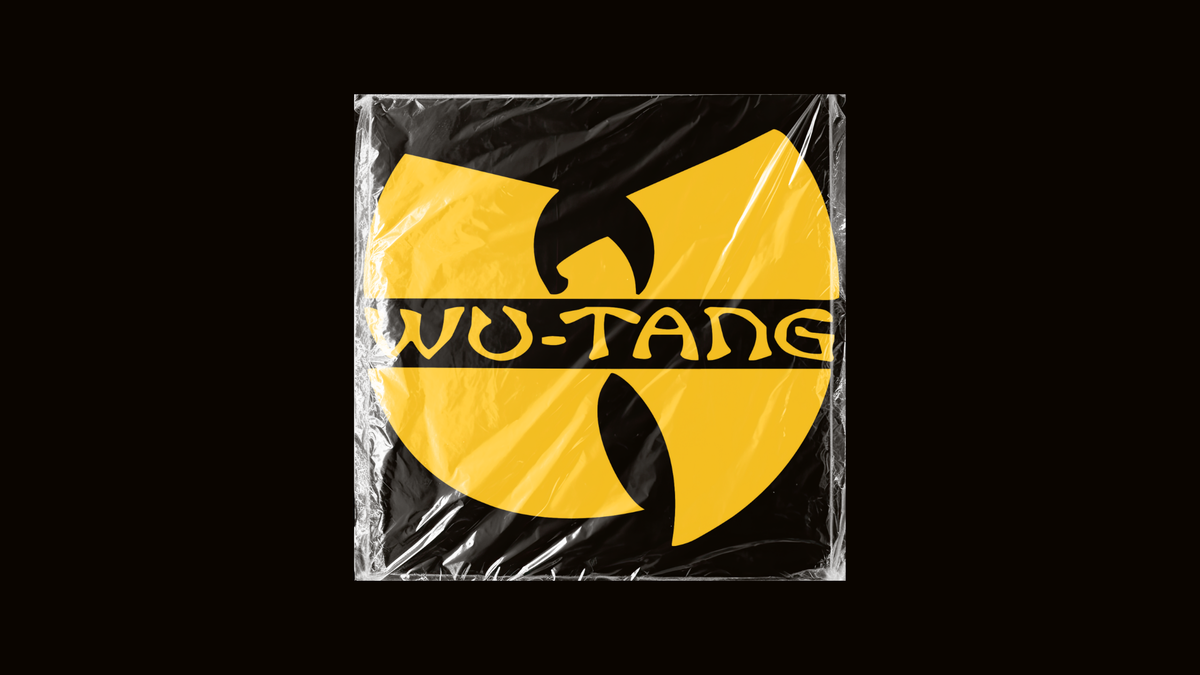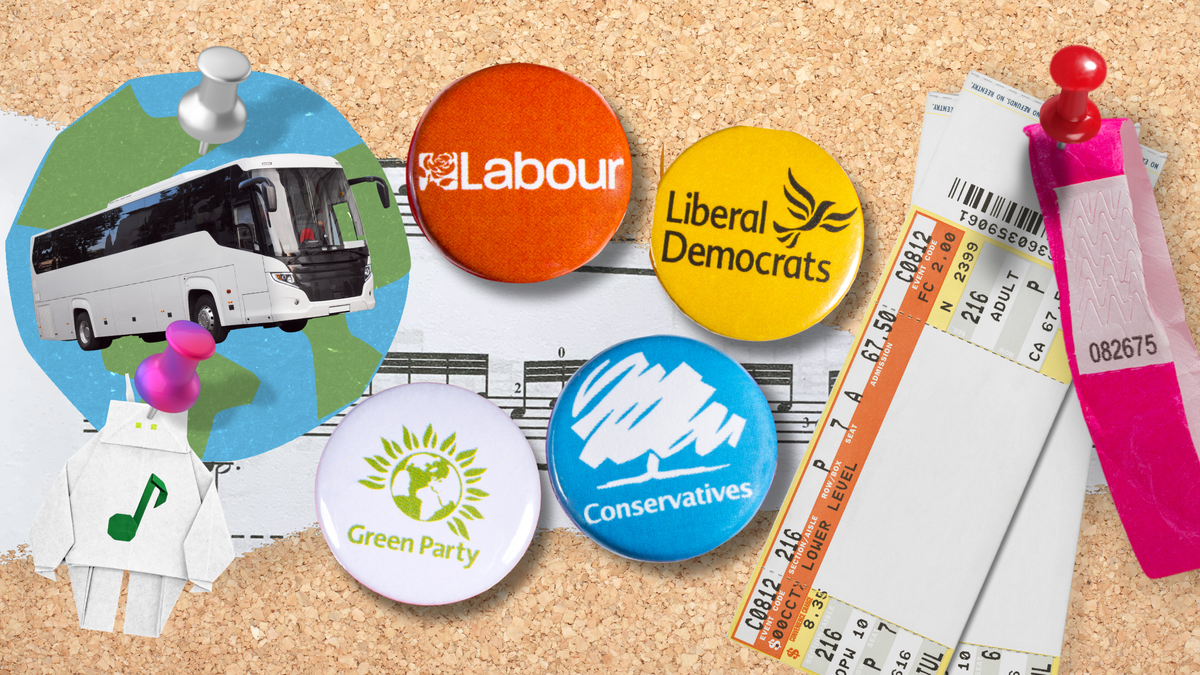On this week’s show, we discuss the latest escalation in the fight over Spotify’s reclassification of its premium subscription as an audiobook and music bundle in the US, the lawsuit against Drake for putting one of his own song titles on a t-shirt, and the return of the band formerly known as Easy Life, who have nothing to do with easyJet.
Section times
01: Spotify (00:10:22)
02: News in brief (00:17:24)
03: Drake and Hard Life (00:19:28)
(Timings may be slightly different due to adverts)
This week's main stories



News in brief



Also mentioned

Transcript
Andy Malt: Setlist, the music business podcast from CMU. This week, Spotify referred to FTC over unlawful conduct.
Welcome to Setlist, the music business podcast from CMU. I'm Andy Malt, or with me is Chris Cook. Hello, Chris.
Chris Cooke: Hello there.
AM: On this week's show, the latest escalation in the fight over Spotify's reclassification of its premium subscription in the US as an audiobooks and music bundle, the lawsuit against Drake for putting one of his own song titles on a t-shirt, and the return of the band formerly known as Easy Life, who have nothing to do with easyJet. But first, Chris, tell me something else that stood out for you in the music world this week.
CC: Well, here in the UK, we're in the UK, not all our listeners are, so I apologise for the non-UK listeners, but here in the UK, we are getting ready for a general election. Everybody is assuming that at the end of that general election, when all the votes are counted, we will have a brand new government here in this country. And in the last week, most of the parties who are competing in that election have published their manifestos. So I have been going through them to see what they say about music. Would you like to know what they say about music?
AM: I would actually, yeah.
CC: Not much, I think is the basic conclusion. Not that we would expect these parties to dedicate too much of their manifestos specifically to the music industry, because apparently other things happen in the world that need the attention of lawmakers and governments, not related to music. But most of them do have a section on culture and as part of that on music.
I guess everybody, I think everybody, is everybody assuming that Labour are going to win this election with a decent majority and therefore form the next government. That seems pretty certain, right?
AM: Yeah, I don't think even the conservatives are suggesting that's not going to happen.
CC: Nothing that current Prime Minister Rishi Sunak has said in the last week suggests he thinks he has any chance of winning this election. So therefore, I guess the only manifesto we really care about is the Labour manifesto, because that is what is going to inform the next government of this United Kingdom.
“Now, obviously these manifestos that are put out during the election campaign, nobody really reads them.So they don't really, I think, have much of a sway on the actual vote. But once we have a government in power and it is then going into parliament to introduce new laws in order to meet some of the things that it sets out in its manifesto, the fact that it was stated in its manifesto basically gives those policies more strength because it's very hard for MPs in the House of Commons and certainly for the House of Lords or even sort of the lobby groups that try to influence what happens in parliament.
It's much harder for them to oppose a government agenda and the government policy if it was in the manifesto because in theory, the people voted for it because it was in the manifesto that none of the people read.
So that's why in a way these manifestos matter, but only really the manifesto of the party that's going to win. That's the Labour Party. So, are you ready for this?
AM: Yes.
CC: This is a bold opening statement in the culture section of the Labour Manifesto. Here we go. With Labour, the arts and music, music gets a specific mention there.
“The arts and music will no longer be the preserve of a privileged few. Culture is an essential part of supporting children and young people to develop creativity and find their voice. There is huge potential for growth in the creative industries that benefit every corner of the UK and Labour will implement our creative industries sector plan as part of our industrial strategy, creating good jobs and accelerating growth in film, music, gaming and other creative sectors”.
So, that is an excellent piece of writing that says a lot, but doesn't really say anything at all, other than culture and music is important. Yeah, we knew that.
There are a few more specifics. So, for example, in terms of music education, there's talk of launching a national music education network, which I think is about making it easier for schools and children at schools and their parents to access the support that is available for kids who want to learn to play an instrument or make music, compose music and indeed work in the music industry.
So, there's one all right commitment around music education and there has been a general feeling that the last fourteen years of conservative government have not really supported music education in the schools or around the schools in any great way. I'm sure the conservatives would disagree, but that is the general perception. Certainly if you talk to any music teachers, that is what they will tell you.
The other interesting thing is remember - did we talk about this on Setlist? We certainly reported on it in the CMU Daily, that not so long ago - Labour made a commitment around ticket touting and the secondary ticketing websites like Viagogo and StubHub.
Now, when they originally made this commitment, they said that they were going to introduce a price cap. So when touts are selling tickets on platforms like Viagogo, they will only be able to mark up the price of the ticket, no more than 10%. That was what they said a few weeks ago. They're not quite that committed in the manifesto, but it is in here. And I think of all the music things, this is the one where they are most explicit.
It says, “Access to music, drama and sport has become difficult and expensive because of ticket touting. Labour will put fans back at the heart of events by introducing new consumer protections on ticket resales”. So the touting commitment has actually made it into the manifesto.
When it comes to the others, obviously the other parties can be a little bit bolder in their manifestos, safe in the knowledge that they'll never have to implement any of this stuff because they're not going to win. Unless of course the Lib Dems accidentally end up in a coalition like they did in 2010 and then it all goes horribly wrong.
But if you quickly look at the others, both the Green Party and the Liberal Democrats talk about touring post-Brexit and all the issues that UK artists have found. Now that the UK is no longer part of the European Union, it's not quite as easy to go and play and tour in other EU countries. And the industry has been calling on the UK government to sit down with both the EU at large and individual countries within the EU to make it easier to tour around Europe for artists.
That is a commitment that the Greens and the Lib Dems are making. The Lib Dems are even stronger when it comes to increasing the importance of music and other art subjects in schools. I would actually say, interestingly on AI, another big talking point in the music industry in the last eighteen months, I guess, I actually think the Greens are strongest on AI when it comes to the perspective of creators and copyright owners, which is interesting because there was a time, this is quite a few years ago now, there was a time where the Greens actually, well, kind of seen almost, the Greens in the UK, I should say, as a bit of an anti-copyright party because there was one manifesto at one election where we suddenly noticed that they were proposing reducing the copyright term.
So at the moment in the UK, on a recording, the copyright lasts 70 years after release, on a song, Life of the Creator, plus 70 years. And at one point, the Greens were saying that that should be cut. And then all of the sort of left-leaning, arty people who are very concerned about climate change suddenly realised that the party they were supporting was trying to cut back their copyright terms.
No more. That is not something the Greens are pushing for anymore. And actually, when it comes to AI, they say, “We would insist on the protection of the intellectual property of artists, writers, musicians and other creators in the context of AI. We would ensure that AI does not erode the value of human creativity and that workers' rights and interests are respected when AI leads to significant changes in working conditions”.
So the others do also talk a little bit about AI and in some cases in the context of creativity and the creative industries, but I think the Greens are by far the strongest on that. There is one other party I've not yet mentioned. That is the Reform Party. So what do the Reform Party say? For non-UK listeners, how do we describe Reform?”
AM: Bunch of idiots.
CC: They grew out of the party that was most pro-Brexit, leaving the European Union. So what was UKIP became the Brexit Party. Well, it didn't become it actually, did it? It was set up in competition with UKIP. Anyway, it's complicated, but it is the group of right-leaning people who were particularly pro-Brexit.
So I downloaded the Reform manifesto, which is a work in progress, they say. And I did a quick search on culture. If you do a quick search on culture in the Reform manifesto, you get bold statements on British culture, cancel culture and agriculture. So they've got opinions on all of those.
“We must protect British culture”, they say. “We must stop cancel culture”, they add. And when it comes to agriculture, they're very keen to encourage all young British people to go and work on farms. But they are very clear, very clear indeed, that although they are very pro farms, they are not pro wind farms. So that's what I learned by looking to see what the Reform manifesto said about culture.
So those are the manifestos. As I say, the only one that really matters is the Labour manifesto, which on one level talks big about the importance of arts, culture and music, although is a little light on specifics, I would say.
But we're not here to talk about any of that in any great detail. We're not interested in the general election. So we'll get on with our main story that we're actually here to talk about on this week's Setlist.
AM: Yes, later on, we'll be talking through some more of this week's most interesting music industry news stories, including research showing that US ticket buyers are waiting until the last minute to buy gig tickets. But first, the US National Music Publishers Association has sent a formal complaint about Spotify's audiobook bundling trick to the Federal Trade Commission. And three Congress members have raised concerns with the copyright office.
This follows the announcement last month that Collecting Society, the MLC, is suing the streaming service. In a letter this week, the NNPA urged the FTC to address unlawful conduct by Spotify that is harming millions of consumers and the music marketplace. So Spotify first added audiobooks to its main premium subscription product last year, and then added a dollar to the cost of that product and reclassified it in the US as a bundle to lower what royalties it pays to songwriters and music publishers.
In doing so, the NMPA says, Spotify has engaged in a scheme to increase profits by deceiving consumers and cheating the music royalty system. Getting specific, it said that this breaches the US Restore Online Shoppers Confidence Act because Spotify failed to clearly and conspicuously disclose the changes it was making to its products and didn't get each subscriber's express informed consent before making those changes. It also reckons that Spotify is violating section five of the FTC Act by falsely representing that the bundled premium plan adds substantial value to consumers.
CC: Now, as you said, that NMPA letter was not the only development in this Spotify bundling story this week. In Congress, in Washington, representatives Adam Schiff and Ted W. Lieu and Senator Marsha Blackburn all signed a letter that was sent to the US Copyright Office.
In that, they said that Spotify should not be able to manipulate the compulsory licence that covers song rights in the US in order to slash royalties and deeply undercut copyright protections for songwriters and publishers. In their letter, they sought advice from the Copyright Office on what steps writers and publishers should now take to address this alleged manipulation, adding a fair system should prevent any big tech company from setting their own price for someone else's intellectual property, whether the owner wants to sell or not.
AM: Okay, so let's do a quick recap on this story. So as I said, Spotify last year added fifteen hours of audiobooks access to its main premium subscription product. More recently, it launched a standalone audiobook subscription product in the US and added a dollar to the cost of the main premium product.
More importantly, it also declared that its main product was now an audiobooks and music bundle, which has a big impact on the royalties it pays songwriters and publishers in the US. So whereas in most countries, Spotify negotiates bespoke deals with publishers and songwriter collecting societies in order to legally exploit song copyrights, in the US, it relies on the compulsory licence with industry-wide terms set every five years by a panel of judges. That licence allows services that bundle music with other content to pay lower rates to publishers and songwriters.
CC: And Spotify is now relying on the bundle discount. However, the publishers argue that Spotify's premium product isn't a true bundle because the 50 million people signed up to it didn't pick an audio books and music bundle. They just got audiobooks access thrown in without asking for it, initially for free and now for an extra dollar a month. Plus to qualify for the bundle discount in the compulsory licence, the non-music content must have more than token value. The publishers reckon that the addition of audiobooks does not meet that requirement.
So, as you mentioned, although the National Music Publishers Association have been very vocal on all of this and what Spotify has been doing with its bundling, it has actually let the collecting society MLC go the litigation route. So the MLC, as you mentioned, has already sued Spotify, basically claiming that its interpretation of the compulsory licence that it qualifies for the bundle discount is incorrect. So that lawsuit is pending, it's working its way through the courts.
Meanwhile, back at the NMPA, before the letter that they sent to the FTC, they sent a cease and desist letter to Spotify, which they then also made available to the wider industry, raising various other grievances with Spotify's licensing practices beyond the compulsory licence. So that related to the way in which Spotify uses music in podcasts and videos and the way it displays lyrics within its app. In addition to that and the letter to the FTC that you've just talked through, another development this week.
So David Israelite, the CEO of the NMPA, updated his members at an annual meeting and said that the organisation had also sent letters to the attorneys general in a whole load of states around the US, basically claiming that Spotify's move also violate various state laws and that maybe these attorneys general want to look into that. So the states where letters have been sent include Tennessee, New York, California, Colorado, Georgia, Connecticut, Illinois, Washington DC, not technically a state, I guess, North Carolina and Oregon. So lots of stuff going on in regards to this dispute as well as the MLC's lawsuit, that initial cease and desist letter, the FTC letter, all of these letters
And David Israelite said at this annual meeting, if anybody thinks that this multi-layered approach to fighting Spotify is overkill, well, he said, welcome to our version of a bundle. Yes, they are bundling the lobbying and litigation work on this front. We unapologetically will defend the rights of songwriters and music publishers. And this attack on songwriters will ultimately fail, he said.
AM: Spotify did provide us with a statement in response to the NMPA's letter in which a spokesperson for the company said, “Spotify's approach to expanding its offering and raising prices is industry standard. We notify users a month in advance of any price increases and offer easy cancellations as well as multiple plans for users to consider. In short, we categorically reject the NMPA's baseless accusations and will continue to provide consumers incredible value and a best in class experience”.
CC: So that's all that's settled. I'm sure that statement will placate every songwriter and music publisher in the US and all of their supporters in Congress. Story over, I'm guessing with that statement there. Of course not. I'm no doubt almost certain that in the weeks ahead we'll be returning to this big war between music publishing songwriters and Spotify in the US that is now being fought on multiple fronts.
AM: Coming up later, Drake's infringing t-shirts and Easy Life's defamatory song - allegedly on both counts. But before that, our news in brief section with a few other stories from the music industry this week, starting with Eventbrite, which has published some market insights based on the sale of tickets to US music events on its platform in the first four months of 2024. It revealed that fans are still buying tickets later than they used to, a trend that began during the pandemic, while more promoters are offering VIP packages and putting shows on sale later too.
CC: Digital distributor Amuse and researching consulting company MIDiA have also published some research this week. This finding that traditional metrics of success like chart positions and radio airplay are no longer a concern for most musicians, as you would probably expect, but interesting to see that confirmed. Instead, the research found, finding an audience of any size and building a sustainable career are the highest priorities for artists in the streaming age.
AM: And lastly, in this week's News In Brief section, convicted fraudster Martin Shkreli has been ordered to hand over copies of the single copy Wu-Tang album that he was forced to give up to the US government in 2021. There is only supposed to be one copy of this album. He was forced to give it to the US government in lieu of money he owed in relation to his fraud conviction. But he's apparently been bragging online that he made several copies of it and in fact played it in live streams. So has been sued by its current owner, PleasrDAO, an NFT company, and has now been ordered by the court to hand over whatever copies, physical or digital, he still has.
You can read more about all of these stories and everything discussed on this week's episode in the show notes or at completemusicupdate.com.
And finally on this week's edition of Setlist, there have been a couple of interesting trademark stories this week relating to Drake and the band formerly known as Easy Life.
Drake was sued for selling t-shirts with the name of one of his own songs on them, because that track also shares its name with that of clothing company, Members Only.
Meanwhile, Easy Life returned this week with their first new music under new name Hard Life, having been forced to change their name following legal action by easyGroup last year. The single, called ‘Tears’, references the battle in a way that the company says is defamatory and a breach of their legal settlement.
CC: So let's start off with this Drake trademark dispute first. As you said, Drake has been selling t-shirts on his most recent tour that feature the words Members Only, that being the name of a track on his 2023 album ‘For All the Dogs’. Selling t-shirts with the title of your tracks on seems like a pretty standard thing artists might want to do.
The problem here though is there's already an American fashion brand called Members Only. And as you would expect for a fashion brand, it sells lots of clothes that feature its name, Members Only. And as part of that, it also owns quite a lot of trademarks in that brand, registered with the US Trademark Office.
To that end, the current owner of the fashion brand, which is called JR Apparel World, has sued the musician's touring company, Away From Home Touring Inc for trademark infringement. It says that Drake's t-shirts are identical, overlapping and or highly similar, so one of those, or maybe all of them, to goods itself bearing its Members Only marks and will therefore confuse at least some consumers into thinking there was a connection between Drake and the clothing business.
AM: Now, despite what JR Apparel says, Drake's t-shirts are actually quite different to those sold by Members Only. Clothing from that brand generally has the brand name quite subtly in a very simple font with the brand name written out in capital letters. Meanwhile, Drake t-shirts have Members Only written in large lowercase text right across the middle of the shirt in quite an ornate font.
And aside from that, any Drake fans going to his shows and buying his t-shirts would surely know that they have the words Members Only printed on them in reference to one of his songs rather than any suggested tie up with this fashion brand.
CC: Now those seem like pretty good points that you've just made. I'm sure they are points that Drake's legal team will want to make if and when this case gets to court. But say the lawyers working for JR Apparel, none of that matters.
Just because Drake has a song called ‘Members Only’, it doesn't mean that there isn't going to be any confusion. And nor does it give him the automatic right to use their brand name on his clothing. So JR Apparel in their legal filing say that they have been trying to settle this dispute with Drake and his company since April this year.
But as of the 6th of June, no settlement has been reached, which is why it is now suing through the courts. It's seeking both damages and a court order, stopping Drake from selling his Members Only shirts from this point onwards.
AM: Now to Easy Life - or Hard Life, as they're now known. The band was sued for trademark infringement last year by easyGroup, the company that manages the trademarks of various company names like easyJet, easyCleaning and yes, easyLife. The band initially said that they planned to fight to keep their name, pointing out how absurd it was that the company could seemingly claim to own the word Easy.
And while easyGroup does own a pretty wide ranging trademark for easyLife, it registered this some years after the band formed. And it also seemed a bit of a stretch that the company could claim that there would be any confusion in the market causing people to think that the band was somehow officially affiliated to easyGroup. That said, the band had parodied easyJet branding on record artwork and merch in the past.
Still, it was arguably unlikely that consumers would think that Easy Life were the official band of easyJet. But this did add an extra layer of uncertainty when it came to the band's chances in court.
CC: So when this all happened last year, the band admitted defeat pretty much within a week of actually being sued, noting that trying to fight litigation could mean bankruptcy and the end of their careers. Now they're back with a new name and a new single.
As you say, it's called ‘Tears’, which says a frontman, Murray Matravers, was written about the legal run-in and highlights the absurdity of the situation, as well as thanking the people who have had my back throughout this whole ordeal. It also directly references easyGroup owner, Stelios Hadji Aionu, with the line, “It was easy in my 20s, now I gotta lawyer up. Give me air miles or fair trials, Stelios”.
AM: The company quickly objected to that lyric telling BBC News that it's disparaging and defamatory and breaches the terms of their legal settlement. A spokesperson added that easyGroup is “disappointed that Hard Life have chosen to needlessly refresh the dispute which the band chose to settle several months ago”.
CC: Now, Andy, having given some legal pointers to Drake's team, I'll give my legal pointers to the band now known as Hard Life. I cannot see how that lyric is in any way defamatory. I don't know what they're talking about. And, you know, if you're a company that does, you know, stupid things, you have to live with the fact you'll be criticised occasionally.
That said, are they in breach of the settlement deal that they did? I can't know that because I've not seen that settlement deal. That would be a matter for the courts if they decide to go to court to dispute the lyrics in this song. It's not the first time the band have been open about the fact that they weren't that happy with how the legal battle turned out.
And maybe, just maybe, even easyGroup, which has a bit of a reputation of going after anybody who uses the word Easy in a name. It is quite a litigious organisation. But surely even an easyGroup, there will be a PR person who would be brave enough to stand up to the lawyers and say, yeah, that's not a battle that we want to pursue in court because it ain't going to do much for our reputation in the court of public opinion. Although having said that, maybe if that PR person existed at easyGroup, they wouldn't be having these stupid trademark battles with musicians. Who knows? We will see, I guess.
AM: But that's all we've got time for on this week's Setlist. We'll be back with another episode next week, and you can keep up to date with all the latest music industry news every day at completemusicupdate.com


